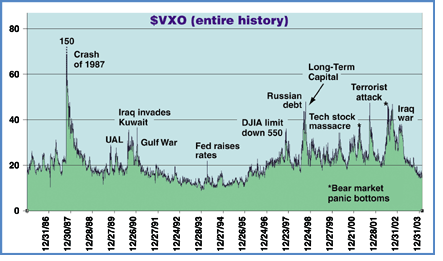Back To The Volatile Future
The New Volatility Futures
by Larry McMillan
They just might be the stock owner's delight.
The CBOE has created a new futures exchange (the CBOE Futures Exchange, or CFE) to trade volatility products. Its first and only product at this time is futures on VIX, the CBOE volatility index, but the CBOE plans to introduce more volatility-related products soon.
Some traders might dismiss these products as simply an opportunity for option-crazed investors. But in reality, these products will find application for a far wider audience than speculators: stock owners can benefit from the ability to hedge their portfolios against volatility risk. In many cases, that translates into a hedge against a falling market. For this reason, the CBOE expects these products to be quite successful eventually.
This article will lay out the basics of the futures, discuss some strategies, and show how a conservative volatility hedge would have worked over the last 10 years.
MECHANICS OF THE CONTRACT
Introduced in 1993, the VIX was created to measure implied volatility of OEX options. In 2003, the CBOE changed the VIX to be the measure of implied volatility of Standard & Poor's 500 Index (SPX) options. The "old" VIX became VXO, and that index still measures the implied volatility of OEX options.
To implement the VIX futures, a new volatility index called the Jumbo CBOE Volatility Index (symbol: VXB) has been introduced. VXB is equal to 10 times VIX. Futures on the jumbo VIX are worth $100 per point of movement of VXB, so one futures contract will make or lose $1,000 when VIX moves by one full point (from 15.00 to 16.00, for example).
These futures trade with the base symbol VIX, and expire in February, May, August, and November. In addition, there is a contract in each of the two nearest months not included in that February cycle. Four months are available for trading at any one time. So if today were June 1, there would be contracts expiring in June, July, August, and November.
The minimum tick in the volatility futures is 0.10 (which is the same as 0.01 for VIX) and is worth $10. Currently, not all quote vendors are disseminating quotes on these futures, because it is onerous for a vendor to set up the software to handle a new exchange when that exchange has only one product. However, as the CFE introduces more products and as they gain popularity, that drawback will be overcome.
The VIX futures have slightly different expiration dates than CBOE-listed index options. The last trading day will be the Tuesday immediately before the third Friday of the expiration month.

Figure 1: History of $VXO. Notice how it trades at all different levels? This makes it difficult to set a fixed level for buy and sell signals.
...Continued in the August issue of Technical Analysis of STOCKS & COMMODITIES
Excerpted from an article originally published in the August 2004 issue of Technical Analysis of STOCKS & COMMODITIES magazine. All rights reserved. © Copyright 2004, Technical Analysis, Inc.
Return to August 2004 Contents